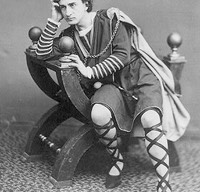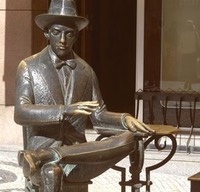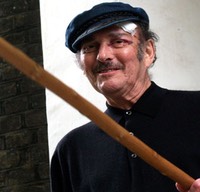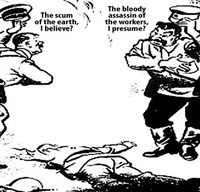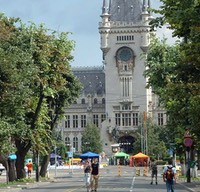Under Ceausescu
"How many Romanian women are too many?"
By Vivid writer: Christopher Lawson
Our Iasi correspondent remembers some of the many colourful foreign lecturers who worked in Romania in the days of the Conducator
Posted: 30/04/2007
Sporting a straggly guerilla’s beard and shoulder-length hair curling round the collar of his camouflage jacket, Francisco, who hailed from Cochabamba, Bolivia’s City of Eternal Spring, could hardly contain his excitement as the Dacia Express approached the Hungarian-Romanian border town of Curtici. On each pocket of his jacket was emblazoned the name of a hero from the communist pantheon, Marx, Lenin, Castro and Guevara. Early in the 1970s, Francisco was on his way to join his wife, the newly appointed American Fulbright lecturer in Iasi. When Romanian police and customs officers reached his compartment, he embraced each in turn and kissed them on both cheeks. “I am so happy to be in a truly communist country!” he exclaimed ecstatically. “I am myself a communist!”

Not all foreign lecturers have hair as long as this.
The authorities found his behaviour and apparel so suspicious that they threw him into a cell overnight for his pains. The following morning, phone calls to the US embassy in Bucharest established that the South American revolutionary was indeed the husband of the Fulbright lecturer in Iasi, and had crossed into Romania to join her. Released from confinement, the chastened Ayamara made his way onwards to the Moldavian capital. On his arrival, not having eaten for 24 hours, he knocked frantically on the door of Roberto Scagno, now of the Univerity of Padua, and promptly emptied his refrigerator.
His wife’s surname was Eichmann. The American academic was the granddaughter of Volga Germans. A number of foreign lecturers and their wives had equally exotic roots. Nacera, the wife of Lionel Lebel, a guitar-playing Breton, was a Kabyle from Algeria. Michele Anciaux from Seattle had Belgian roots. My successor Tim Williams was married to the most exotic wife of all, a Guadeloupean. At that time an Antillaise could blend in easily with the considerable African population in Iasi.
It was bad enough that foreign lecturers brought strong opinions, rock music, newspapers, magazines and designer clothes to Ceausescu’s hermetically sealed paradise. To import a dash of cosmopolitanism as well was unforgivable.
Later in the 1970s, in Constanta, the Fulbrighter, a German literature specialist from the mid-West, fell in with the only other American citizen in town, a Caterpillar tractor mechanic and maintenance man hailing from Hawaii. After dusk in the spring, the academic and his newfound blue-collar Polynesian friend, who had a black belt in karate, were strolling along the seafront after dinner with two young Romanian women. Their western origins gleamed in the moonlight. A policeman stopped them and asked them for identification. Infuriated by this intrusion into his romantic evening, the tattooed Hawaiian hissed: “I’m going to lay him out.” “You crazy?” the lecturer whispered back. He had come to southeastern Europe to spread American culture, not to flatten the local fuzz. “It’s ok,” replied the confident islander. “When he wakes up in the morning he won’t remember a thing.” With an expert chop, he thumped the law enforcement officer, who collapsed unconscious on the sidewalk. History records that the martial arts fighter was right. The American served out his contract without incident, but probably with added stature for the company he kept.
Another Fulbright lecturer had such a rich and wonderful time in Romania that, after returning for a few years to the US, he applied to return for a second full-year Fulbright lectureship. Unfortunately, although he was recommended for the lectureship by his US scholarly peers, the Romanian Ministry of Education did not approve him for the return visit. The lecturer, who had acquired the patient but persistent ways required at the time to get anything at all done in Romania, visited Romania on his own and finally managed to get an audience with someone he knew at the university who would be in a position to explain. The lecturer asked: "Can you please tell me how it happened that my request was denied to return for a second year? Was it that failing grade I gave to the daughter of a high-ranking party official, despite the advice of all my Romanian faculty colleagues to give her a high mark, even though she was a terrible student?"
The university representative responded: "No, but the Ministry of Education is of the opinion that in your year with us you slept with too many Romanian women.” (rom: "Ministerul Invatamantului este de parere ca in cursul anului pe care l-ati petrecut la noi ati dormit cu prea multe romance.") The lecturer: "Cate romance sunt prea multe?" ("How many Romanian women are too many?") He was trying to determine exactly which Romanian woman had taken him over his limit. His ability to formulate his final question so quickly demonstrated how well he had absorbed the Romanian sense of humour in defeat, as well as the Romanian penchant for speculation that was theoretically strategic but practically pointless.
Observant Romanian watchers of foreign lecturers in Iasi university circles rejoiced most over a studious Fulbrighter who managed to baffle the Securitate. Most foreign lecturers practiced the usual male vices, chasing sultry Balkan women and consuming Romanian wine and tuica in heroic quantities. This lecturer, however, showed no interest either in the fair sex or in alcohol. Instead, his greatest pleasure lay in consuming copious amounts of Romanian food. The secret police could find no other weakness.
Roberto Scagno, today Europe’s greatest authority on the work of Mircea Eliade, ensured a regular supply of wine through his girlfriend, who had good connections with the Party. The Party and the Church owned the best vineyards between them. Taking his lead from the Genius of the Carpathians, the official soubriquet of the President, Roberto carefully referred to the Conducator as “le grand forestier”. The French lecturers generally lived blamelessly domesticated lives, working on their doctorates by day and snuggling up with their Romanian fiancées at night. In their six hours of weekly teaching, they contributed to the general subversion of communism by showing videos of French television shows with ads, which the students had never seen before.
Equally respected by the ambassadors of both East and West Germany, Helga Crossman, doyenne of the foreign lecturers, had spent five years in Iasi working on her doctorate. Her supervisor in Tuebingen was the distinguished Romanian-born linguist, Eugenio Coseriu. Helga told me how she had survived that long in an information-shorn world of rumour. She could not sleep at night until she had rerun in her mind all the conversations she had taken part in that day. Only when she recalled what A had told her about B, or X about Y, and whether or not she had unwittingly divulged any confidences herself, could Helga summon up the honey-heavy dew of slumber. For three months during a particularly heavy winter, Helga skied from her apartment in Podul Ros to the University. Not unnaturally, she became something of a local celebrity. To everyone’s joy, Helga, a supreme diplomat herself, became engaged to a diplomat at the West German embassy, who was about to be posted to Peru. On his visits to Iasi she gave him weekend lessons on hand-kissing, teaching him how not to crack his teeth on the lady’s knuckles when introduced.
From Central America, Jorge Blanco Campos, a specialist in Kafka, spent two years in Iasi. While the Generalissimo still ruled in Spain, democratic Costa Rica provided Spanish lecturers. Allowed one phone call to San Jose during his lectureship, Jorgito reported to his family that life in Iasi was muy austere (eng: terribly austere), to the consternation of the Securitate.
Maria, the young Polish lectorita from Gdansk, who spoke impeccable French, had to leave after three months. She felt that everyone was spying on her (which they were, of course). I joined the Professor of Russian and her team at the station to see her off. It seemed to me totally unjust that a fellow-Warsaw Pact member should suffer from the anti-foreigner paranoia raging at the time.
Nor should we forget the name of the first secretary of the communist party in Iasi in the second half of the 1970s. The Party controlled the Securitate, which, on its own, could not recruit its officers. This gentleman, unusually multilingual, became quite famous after December 1989. His name is Ion Iliescu.
